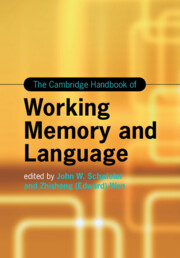Book contents
- The Cambridge Handbook of Working Memory and Language
- Cambridge Handbooks in Language and Linguistics
- The Cambridge Handbook of Working Memory and Language
- Copyright page
- Contents
- Figures
- Tables
- About the Editors
- About the Contributors
- Acknowledgments
- Overview of the Handbook
- Part I Introduction
- Part II Models and Measures
- Part III Linguistic Theories and Frameworks
- 13 Have Grammars Been Shaped by Working Memory and If So, How?
- 14 Branching and Working Memory
- 15 Working Memory and Natural Syntax
- 16 The Role of Working Memory in Shaping Syntactic Dependency Structures
- 17 Working Memory in the Modular Cognition Framework
- 18 Short-Term and Working Memory Capacity and the Language Device
- Part IV First Language Processing
- Part V Bilingual Acquisition and Processing
- Part VI Language Disorders, Interventions, and Instruction
- Part VII Conclusion
- Index
- References
13 - Have Grammars Been Shaped by Working Memory and If So, How?
from Part III - Linguistic Theories and Frameworks
Published online by Cambridge University Press: 08 July 2022
- The Cambridge Handbook of Working Memory and Language
- Cambridge Handbooks in Language and Linguistics
- The Cambridge Handbook of Working Memory and Language
- Copyright page
- Contents
- Figures
- Tables
- About the Editors
- About the Contributors
- Acknowledgments
- Overview of the Handbook
- Part I Introduction
- Part II Models and Measures
- Part III Linguistic Theories and Frameworks
- 13 Have Grammars Been Shaped by Working Memory and If So, How?
- 14 Branching and Working Memory
- 15 Working Memory and Natural Syntax
- 16 The Role of Working Memory in Shaping Syntactic Dependency Structures
- 17 Working Memory in the Modular Cognition Framework
- 18 Short-Term and Working Memory Capacity and the Language Device
- Part IV First Language Processing
- Part V Bilingual Acquisition and Processing
- Part VI Language Disorders, Interventions, and Instruction
- Part VII Conclusion
- Index
- References
Summary
This chapter examines variation patterns across the world's grammars in relation to working memory (WM) models in psycholinguistics. It distinguishes: (1) constrained capacity proposals in which certain limits in WM are used to explain why some grammatical phenomena are (or are supposed to be) nonoccurring; (2) more versus less WM proposals where greater or lesser demands on WM are reflected in dispreferred versus preferred structures and in declining typological distributions across languages; and (3) integrated WM proposals where WM considerations interact with other factors that facilitate processing. These include prediction, and communicative efficiency, with the result that structures that add to WM load can sometimes be preferred across languages. It is proposed that grammars have conventionalized the preferences of language performance and so have been shaped by the same processing considerations, including WM load, that determine usage data within individual languages and that lead to the preferences in performance. As a result grammars and cross-linguistic comparison can provide relevant evidence for certain issues in language processing that are being debated currently, such as the precise nature and role of WM and its interaction with other processing considerations. These grammatical data come from a vast range of languages that psycholinguists have yet to consider
Keywords
- Type
- Chapter
- Information
- The Cambridge Handbook of Working Memory and Language , pp. 275 - 303Publisher: Cambridge University PressPrint publication year: 2022
References
- 2
- Cited by

